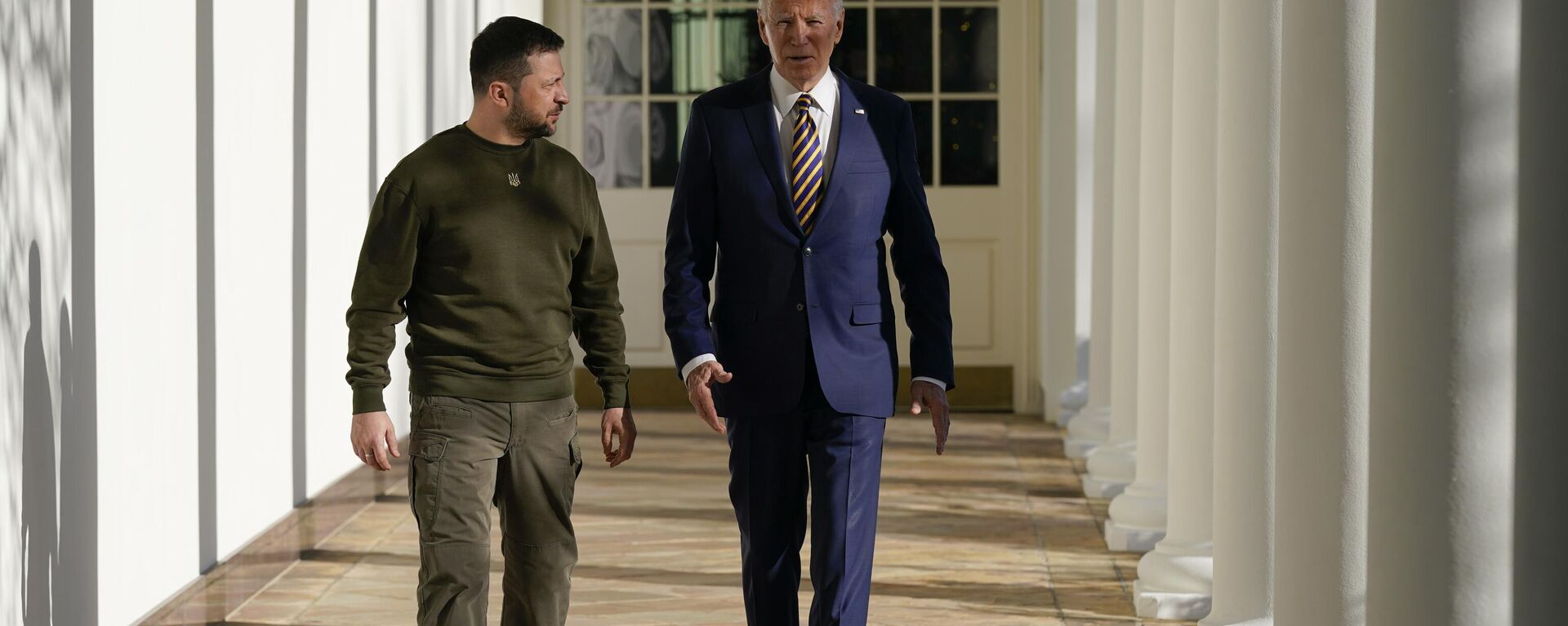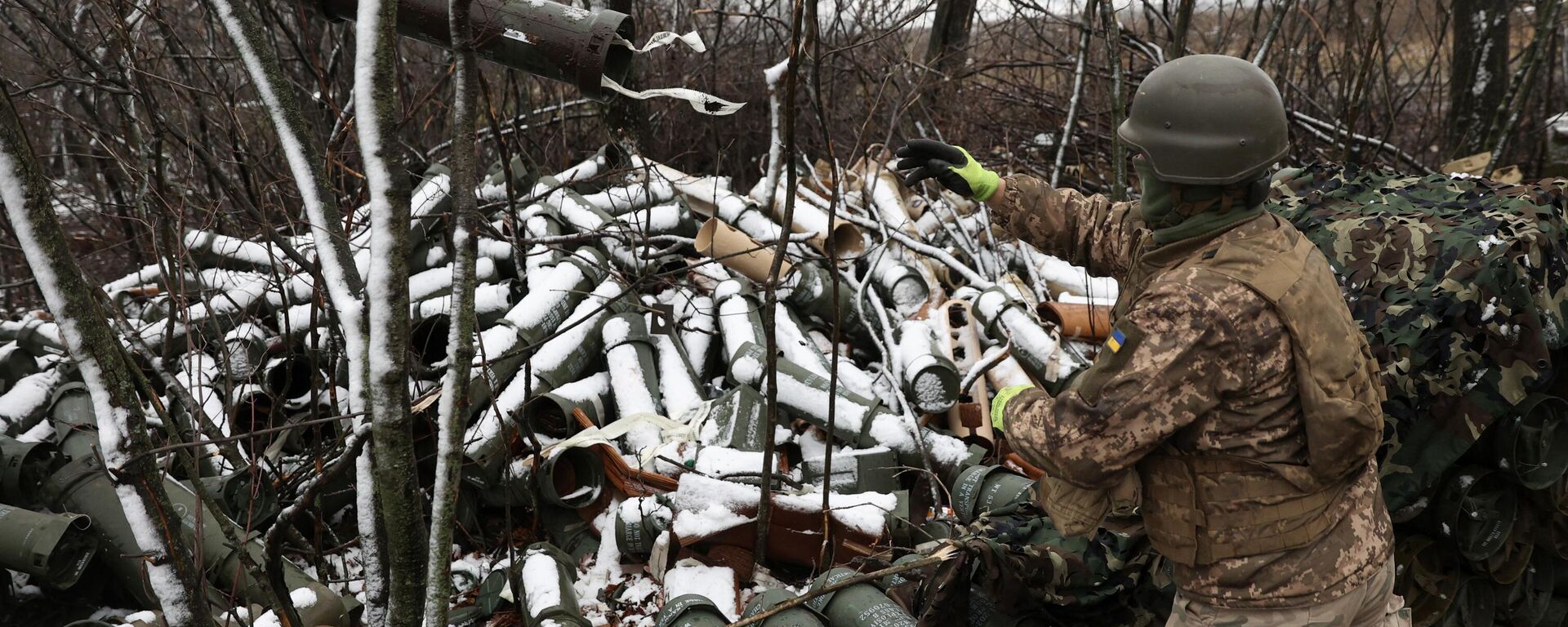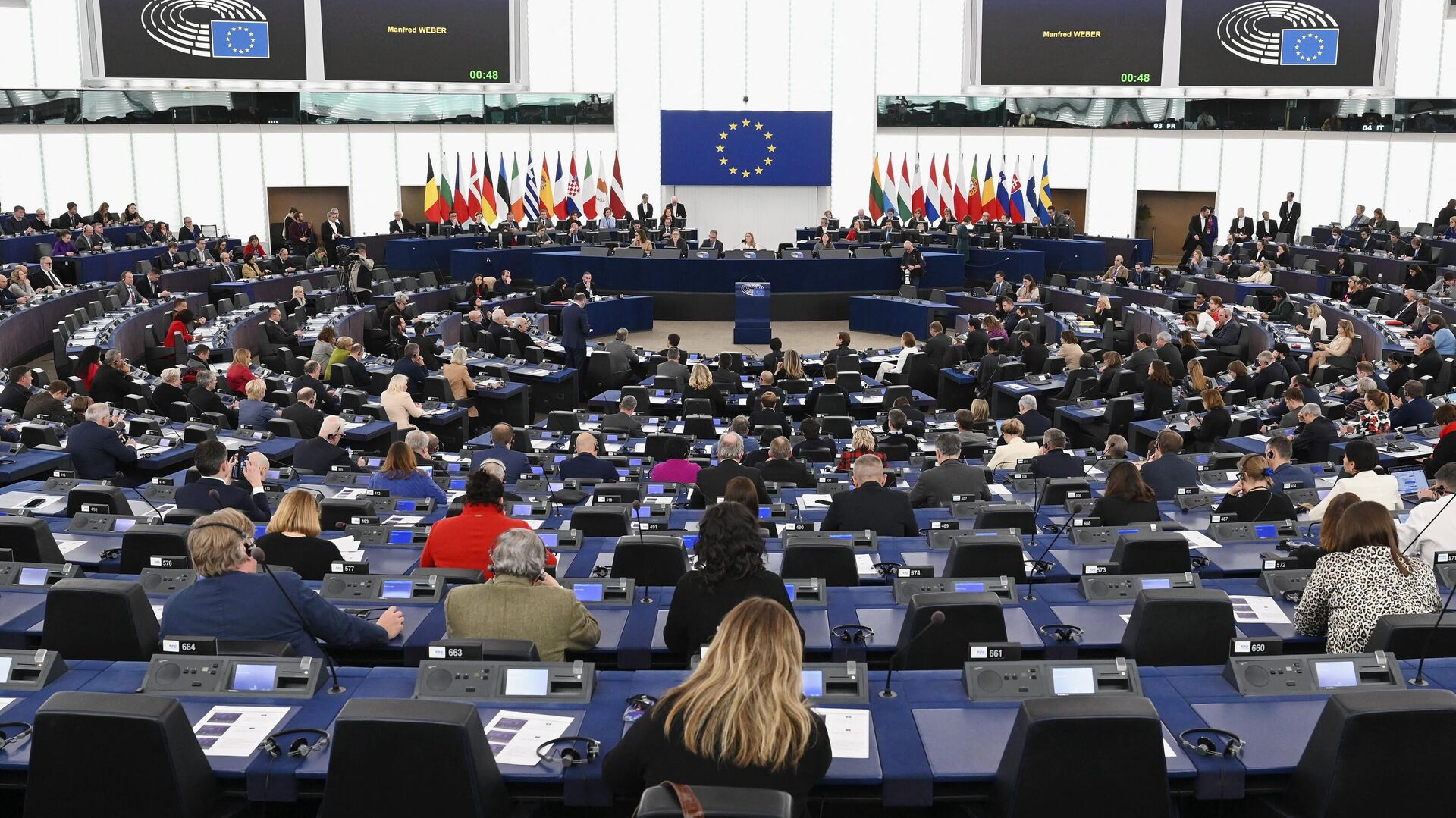https://sputnikglobe.com/20230216/european-parliament-cuts-passage-about-danger-of-nuclear-war-from-resolution-on-ukrainian-crisis-1107516969.html
European Parliament Cuts Passage About Danger of Nuclear War From Resolution on Ukrainian Crisis
European Parliament Cuts Passage About Danger of Nuclear War From Resolution on Ukrainian Crisis
Sputnik International
When the European Parliament adopted a resolution Thursday on the upcoming one-anniversary of the date that the Ukrainian crisis escalated into a full-blown... 16.02.2023, Sputnik International
2023-02-16T19:25+0000
2023-02-16T19:25+0000
2023-02-16T19:25+0000
world
russia
european parliament
resolution
nuclear war
ukraine
https://cdn1.img.sputnikglobe.com/img/07e6/0c/0d/1105405132_0:158:3078:1889_1920x0_80_0_0_d3aa05de5ac478c71c89d9c3e8e476fa.jpg
The move came at the EP’s plenary session in Strasbourg, France, with lawmakers calling for a redoubling of Western support for Ukraine and the prosecution of the Russian and Belarusian officials at a tribunal.The passage should have been uncontroversial: the leaders of all four nuclear powers involved in the conflict - Russia, France, the UK and US - have made explicit statements regarding the potential for nuclear weapons to be used and how they would respond to such a situation. In addition, the possibility of a direct shooting war between NATO and Russian forces has arisen more than once since February 2022, not just due to NATO proximity to the conflict but also the spread of fake news in the Western press.Meanwhile, in the resolution the EP called for the defeat of Russia at any cost and called on EU member states to adopt the latest tranche of proposed anti-Russia sanctions. It pledged the EP’s support for arming Ukraine for as long as necessary and called on Western nations to seriously consider giving Ukraine fighter jets, helicopters, adequate missile systems, and vast quantities of ammunition. The body also pledged its support for Ukraine reconquering five former provinces which joined the Russian Federation after holding plebiscites on the question - votes Western powers have refused to recognize as legitimate.Russia launched the special operation in Ukraine on February 24, 2022, after months of negotiations with Kiev and the NATO powers over Moscow’s security red lines failed to achieve results, and amid fears of an imminent Ukrainian offensive against the breakaway Russophone republics in the eastern Donbass region.During the conflict, the two breakaway republics, plus two other Russian-speaking provinces, held referendums on leaving Ukraine and joining the Russian Federation. They followed Crimea, which made the decision in 2014 after a government in Kiev that came to power following a US-backed coup unleashed attacks against ethnic Russians and Russian-speaking Ukrainians.
https://sputnikglobe.com/20230216/ukrainian-whistleblower-telizhenko-us-intentionally-made-ukraine-powerless-in-order-to-rule-it-1107512120.html
https://sputnikglobe.com/20230216/rate-of-ukraine-ammunition-use-makes-us-review-stockpiles-weigh-up-spending-hike-milley-1107506998.html
russia
ukraine
Sputnik International
feedback@sputniknews.com
+74956456601
MIA „Rossiya Segodnya“
2023
News
en_EN
Sputnik International
feedback@sputniknews.com
+74956456601
MIA „Rossiya Segodnya“
Sputnik International
feedback@sputniknews.com
+74956456601
MIA „Rossiya Segodnya“
russia, european parliament, resolution, nuclear war, ukraine
russia, european parliament, resolution, nuclear war, ukraine
European Parliament Cuts Passage About Danger of Nuclear War From Resolution on Ukrainian Crisis
When the European Parliament adopted a resolution Thursday on the upcoming one-anniversary of the date that the Ukrainian crisis escalated into a full-blown Russia-NATO proxy war in Ukraine, it omitted a proposed passage about the risk of nuclear war as a result of the bloc's support for Kiev.
The move came at the EP’s plenary session in Strasbourg, France, with lawmakers calling for a redoubling of Western support for Ukraine and the prosecution of the Russian and Belarusian officials at a tribunal.
The cut passage had been proposed by the EP's Left Group, a caucus of MEPs from socialist and communist parties. It read: "People across Europe are deeply concerned about a war that could potentially lead to a war between nuclear powers.”
The passage should have been uncontroversial: the leaders of all four nuclear powers involved in the conflict - Russia, France, the UK and US - have made explicit statements regarding the potential for nuclear weapons to be used and how they would respond to such a situation. In addition, the possibility of a direct shooting war between NATO and Russian forces has arisen more than once since February 2022, not just due to NATO proximity to the conflict but also the spread of fake news in the Western press.

16 February 2023, 17:03 GMT
Meanwhile, in the resolution the EP called for the defeat of Russia at any cost and called on EU member states to adopt the latest tranche of proposed anti-Russia sanctions. It pledged the EP’s support for arming Ukraine for as long as necessary and called on Western nations to seriously consider giving Ukraine fighter jets, helicopters, adequate missile systems, and vast quantities of ammunition. The body also pledged its support for Ukraine reconquering five former provinces which joined the Russian Federation after holding plebiscites on the question - votes Western powers have refused to recognize as legitimate.
The resolution was adopted by 444 votes in favor, 26 votes against and 37 abstentions.

16 February 2023, 13:57 GMT
Russia launched the special operation in Ukraine on February 24, 2022, after months of negotiations with Kiev and the NATO powers over Moscow’s security red lines failed to achieve results, and amid fears of an imminent Ukrainian offensive against the breakaway Russophone republics in the eastern Donbass region.
The operation aims to halt attacks on Russian-speakers by neo-Nazi forces and prevent the stationing of NATO offensive weapons on Ukrainian soil by rendering Ukraine a neutral state.
During the conflict, the two breakaway republics, plus two other Russian-speaking provinces, held referendums on leaving Ukraine and joining the Russian Federation. They followed Crimea, which made the decision in 2014 after a government in Kiev that came to power following a US-backed coup unleashed attacks against ethnic Russians and Russian-speaking Ukrainians.




